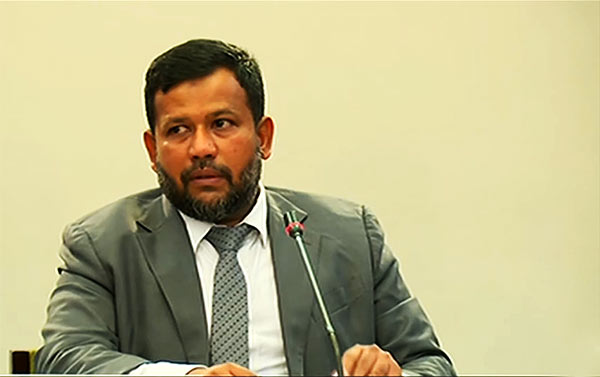“Zahran Hashim and his group were not Muslims; they hijacked the name of Islam to commit these crimes”

The Muslims never called for separatism. The Muslims have been on the side of the nation for over 1,000 years in Sri Lanka as documented in the book of Dr. Lorna Devaraja titled, ‘The Muslims of Sri Lanka – One Thousand Years of Ethnic Harmony’. Even when the Muslims were threatened with eviction or death from the North, they risked their lives and the lives of their loved ones to be on the side of the State, Rishad Bathiudeen, MP, said.
Speaking in English during the fifth day of the debate on the report of the Commission of Inquiry on the Easter Attacks in Parliament on April 7, he said: “Zahran Hashim and his group were not Muslims. They hijacked the name of Islam to commit these crimes. The report in Page 94 confirms that Zahran wanted to build tensions between the Sinhalese and Muslim Communities of Sri Lanka”.
The MP’s speech contained many points and references to matters in the report and events that transpired thereafter.
Some of the points raised by the MP were:
- The State is antagonizing the Muslim community in the manner that Zahran had wanted them to act. The State should not play to the tunes of Zahran. The State should not act in a way that would jeopardize national security. The State has already commenced the process of State sponsored oppression by prohibiting the import of Muslim books and are making plans to ban Niqabs/Burkas and Madrasas.
- The PCoI has exonerated Rishad Bathiudeen from all charges in connection with the Easter attacks. Only two charges remain to be investigated. First one is in relation to the phone call placed by Bathiudeen to then Army Commander General Mahesh Senanayake, concerning Ihsan Moinudeen. Secondly, the sale of scrap metal by the Industrial Development Board to Colossus (Pvt) Ltd. Rishad Bathiudeen visited the Bribery Commission on 8th of April, 2021 to request them to investigate the allegation in the report.
- The weight placed on the phone call made by Rishad Bathiudeen to General Mahesh Senanayake, was given far higher significance in the report in comparison to the actions of Dayasiri Jayasekara who released six persons from the Hettipola Police Station who were involved in torching and destroying Muslim owned shops and Muslim places of worship. The Commission Report had recommended investigation into the phone call but had not charged Dayasiri on any matter.
- The Government cannot have a law banning the Niqab and Burka without also banning medical masks, helmets, sunglasses, etc.
- Restriction of Islamic books being brought into the country is a violation of the Constitution.
- Bathiudeen quoted Page 331 of the Report:‘Reciprocal radicalization is the cycle of radicalization which promotes each other’s radicalized ideologies’. If the Government can keep politicians like Wimal Weerawansa in check, the de-radicalization program will be half completed. He also said that inciting racism will only provoke and radicalize more Muslims.
- Killing of Fouzul Ameer Mohamed Salley in Kottramulla before his children in the aftermath of the Easter Attacks, was Genocide under Article 2 of the Genocide Convention, and all persons who were inciting racism could be charged for incitement to genocide. Subsequent charges of oppression too can have a detrimental effect on Sri Lanka. Sri Lanka must be careful as Sri Lanka is now a party to the Rome Statute and can be held accountable by the International Criminal Court.
- It was Azath Salley who indicated during a press conference concerning the criminal activities of Zahran Hashim in 2017, but he is alleged to have connections to the Easter Attacks. This is not fair. The Government is politically victimizing Muslims who are speaking up against the oppressive tactics of the Government.
- The One Country One Law Policy does not mean that Muslim Personal Laws alone should be targeted. Most people believe that Customary Laws should be removed. However, that logic would require the Government to abolish Provincial legislation too, as Provincial legislation is also territorially implemented and not countrywide. Several laws will have to be struck down. However, the right way of interpreting the One Country One Law policy would be to maintain all laws that are consistent with the Constitution of Sri Lanka.
(Source: The Island)

Latest Headlines in Sri Lanka
- Court of Appeal to rule on IGP Tennakoon’s arrest warrant on March 17, 2025 March 12, 2025
- Military deserter arrested for sexually assaulting doctor at Anuradhapura Hospital March 12, 2025
- Tuition teacher under investigation for student assault ignores NCPA summons March 12, 2025
- Sri Lanka maintains stance on Adani, open to investment March 12, 2025
- Doctors strike over delay in arrest of sexual assault suspect March 12, 2025


